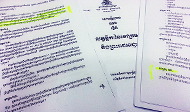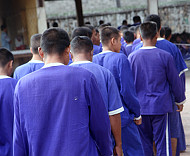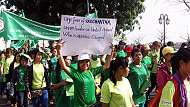Laws / Regulations
Briefing Paper | Legal Analysis of Cambodia's Draft Law on Unions of Enterprises
18 September 2014
Today, CLEC and LICADHO release a legal analysis of the latest draft of the Law on Unions of Enterprises (Trade Union Law) obtained at the end of May, this year. As unions yesterday began a nationwide campaign for a $177 per month minimum wage, the draft Trade Union Law underlines the government’s intent to interfere with and infringe upon union formation and activities.
Flash Info | The Constitutional Council declares three laws on the judiciary compatible with the constitution.
4 July 2014
Today the Constitutional Council declared that three new laws on the judiciary, the Law on the Organization of the Courts, the Law on the Organization and Functioning of the Supreme Council of Magistracy, and the Statute of Judges and Prosecutors, are consistent with the Cambodian constitution and can therefore be promulgated, following approval by the King.
In a statement released last month, LICADHO urged the Constitutional Council to reject the laws as they are currently drafted on the grounds that they do not comply with the constitution: whilst the constitution protects the independence of the judiciary, the three laws will improperly legitimize and entrench government control over the courts and judges.
The laws were approved earlier this year by the National Assembly and the Senate. No public consultations were carried out on the draft laws and as a result of the almost year-long boycott of the National Assembly by opposition party members, they have been subjected to no proper legislative scrutiny.

15 June 2014
On the anniversary of Cambodia’s Constitutional Council, LICADHO urges the Council to reject the three new laws affecting the judiciary in their current form. The Cambodian Constitution mandates that “Judicial power shall be an independent power,” and necessary implementing legislation has long been called for to strengthen the rule of law. However, passage of these laws in their current form will codify and indefinitely prolong the lack of independence currently undermining the Cambodian justice system.
Statement | Cambodia’s Legislature Dismantled on the Eve of the National Elections
10 June 2013
Cambodia’s National Assembly – its key legislative organ – has been thrust into a Constitutional crisis less than two months before the country’s national elections. Last week, the National Assembly’s Permanent Committee, which is comprised entirely of ruling Cambodia People’s Party members, stripped all 29 opposition party members of their parliamentary status. Because this expulsion took place within 6 months of a national election, the seats left empty by the purged parliamentarians were effectively terminated and will remain so under until after the election.
Statement | New Circular Aims to Shut Down Internet Cafes in Cambodia
13 December 2012
The government has issued a new circular ordering the closure of all Internet cafes within a 500 meter radius of schools and educational institutions – an order that, if implemented, would amount to a near-complete ban on such businesses in central Phnom Penh.
The circular, issued by the Ministry of Posts and Telecommunications on November 12, 2012, also provides for further restrictions not limited by this school buffer zone. All Internet cafes are also required to forbid playing “all kinds of games,” essentially equating such activity with viewing pornography or committing crimes
Briefing Paper | Cambodia's Draft Law on the Management and Use of Agricultural Land
23 July 2012
Late last year, the Cambodian government quietly released a draft Law on the Management and Use of Agricultural Land that would have serious implications for private landholders. The draft law as currently written could be used as legal cover for land-grabbing and for those who wish to exploit and personally profit from Cambodia's land and resources. Most alarmingly, the law creates felony criminal liability for any actions that violate the law's far reaching provisions. The following aspects of the draft law require immediate scrutiny and substantial revisions.
Briefing Paper | Comments and Recommendations on Inter-Ministerial Prakas on the Prohibition of Using Prison Labor for Producing Export Goods
9 May 2012
New government regulations take the important step of banning the export of prison-made goods, but fall short of fully protecting inmates from exploitation by private firms, according to a new briefing from LICADHO.
LICADHO believes that the export ban is an important step in protecting Cambodia's reputation as a reputable supplier in the international garment industry. But the prakas fails to fully ban private firms from using prison labor for domestic production, which leaves prisoners open to systematic rights violations.
Statement | Revise or Abandon Draft NGO Law: Donors Should Insist on Protections for Civil Society
22 December 2011
Donors, who provide approximately half of Cambodia's national budget, should make clear to the Cambodian government that the fourth draft of the Law
on Associations and NGOs (LANGO) must be revised to protect civil society or be withdrawn, a group of concerned international human rights organizations said today. Any revisions should involve meaningful consultation with civil society organizations and aim to support their activities instead of creating a legal framework allowing for arbitrary closure of organizations or the denial of registration.
Briefing Paper | Draft Law On Associations & NGOs: Comments on the Fourth Draft
15 December 2011
On Dec. 12, 2011, the Royal Cambodian Government released the fourth draft of its proposed Law on Associations and Non-Governmental Organizations (LANGO). The release comes almost exactly one year after the first draft was introduced in mid-December 2010.
The contents of the three earlier drafts provoked extensive criticism from local and international civil society organizations, donor governments, and legal analysts. Twice previously the government has acknowledged these criticisms and promised to come up with a better draft. Twice previously they have failed.
With the fourth draft, they have failed again.
Report | The Delusion of Progress: Cambodia's Legislative Assault on Freedom of Expression
26 October 2011
Since 2008, the Cambodian government has embarked upon a furious campaign to propose and enact a wide range of new laws. While this new legislation is typically touted as evidence of Cambodia’s progress toward the rule of law, a new LICADHO report has found that in many cases, it actually marks the opposite.
In the report, “The Delusion of Progress: Cambodia’s Legislative Assault on Expressive Rights,†LICADHO analyzes five key laws proposed or enacted since 2008: the Penal Code, the Anti-Corruption Law, the Law on Associations and NGOs, the Law on Peaceful Assembly, and the Law on Unions of Enterprises. Overall, the analysis reveals several disturbing trends: Legislation is littered with improper restrictions on freedom of expression, provisions are misapplied, and vast sections are deliberately drafted to be used as weapons against those who speak out against the political and financial elite.

19 October 2011
A draft prison law which is set to go before the National Assembly is a positive step for Cambodia's prison system, but falls short of fully protecting prisoners' rights in several key respects.
The draft law's shortcomings are detailed in a new briefing paper from the Cambodian League for the Promotion and Defense of Human Rights (LICADHO). The paper also highlights a handful of the law's positive provisions.
Flash Info | International NGOs urging United Nations agencies to act on repressive Association & NGO Law
15 September 2011
Ten international organizations wrote to representatives of 17 United Nations (UN) agencies urging them to press the Cambodian Government to end its efforts to promulgate the repressive Law on Associations and Non-Governmental Organizations (LANGO).
A copy of the letter sent to the United Nations Development Programme (UNDP) can be viewed in English or in Khmer.
(The letters were sent to FAO, UNFP, IFAD, UNHCR, ILO, UNICEF, IOM, UNIDO, OHCHR, UNODC, UNWomen, UNESCO, WHO, UNEP, WFP, UNDP and UNAIDS)
Briefing Paper | New Sub-Decree on Migrant Labor Fails Dismally on Workers Rights
31 August 2011
Cambodia's recently-enacted sub-decree on migrant labor is a "dismal failure" for workers and should be scrapped in favor of a new law, according to an analysis by LICAHDO.
LICADHO has documented horrific abuses in the industry over the past two years, including the use of debt bondage, deaths inside pre-departure training centers, the recruitment of underage workers, illegal detention of workers, the facilitation of forged documents, and the failure to pay salaries. None of these areas are addressed in the new law. Worker protections, meanwhile, are vague, limited in scope, and in many cases less stringent than the 1997 law it superseded, Sub-Decree 57.
Flash Info | International NGOs urging foreign ministers worldwide to act on repressive Association & NGO Law
27 August 2011
Little time remains before the Law on Association and NGO is sent to the National Assembly leading to its final adoption. This week, 10 International NGOs wrote to 35 foreign ministers worldwide and EU High Representative for Foreign Affairs and Security Policy Baroness Ashton urging them to press the Royal Government of Cambodia to end efforts to promulgate this law. The letter also calls for a reassessment of bilateral assistance should the law be adopted in its current form.
A copy of the letter sent to US Secretary of State Clinton can be viewed in English or in Khmer.
Briefing | Draft Law On Associations & NGOs: Comments on the Third Draft
1 August 2011
On July 29, 2011, the government released a third draft of its widely criticized Law on Associations and on-Governmental Organizations (NGO Law), once again claiming that the newest draft addresses the litany of concerns that have been raised by civil society. One needs look no further than the first chapter of the law, however, to discredit the government's reassurances. Registration is still mandatory, meaning Cambodians cannot exercise their fundamental rights of assembly, expression and association without navigating complex registration procedures and securing the blessing of government officials, who would be given absolute power to create or dissolve civil society groups.
The majority of LICADHO's comments in its briefing papers discussing the first and second drafts of the law are still relevant. As with the second draft, the remaining changes in the third draft are almost entirely cosmetic. The third draft does, however, make one significant improvement in that it expressly mentions a right to appeal a denial of registration. This welcome addition is not without its own issues - namely the lack of a timeline and legal standards for assessing an appeal - but it is an important reflection of the impact that advocacy efforts have had to date.

6 May 2011
On May 1, 2011, some 3,000 Cambodians gathered in Phnom Penh to celebrate International Labor Day. This photo album documents their march from near Wat Phnom to the National Assembly.
Article | Cambodia: Withdraw Flawed Draft NGO and Association Law; Revised Draft Does Not Address Rights Concerns
7 April 2011
Bangkok - Cambodia's draft law regulating associations and nongovernmental organizations (NGOs) should be abandoned because it will undermine rather than promote civil society in the country, Human Rights Watch, Amnesty International, Forum-Asia, Global Witness, Southeast Asia Press Alliance, Frontline Defenders, and the International Federation for Human Rights (FIDH) and World Organisation Against Torture (OMCT) within the framework of the Observatory for the Protection of Human Rights Defenders said today. On April 6, a total of 62 international organizations working in Cambodia called upon the country's international donors to make strong public and private statements opposing passage of a law that poses the most significant threat to the country's civil society in many years.
Briefing | Comments on the Second Draft Law on Associations and Non-Governmental Organizations of the Kingdom of Cambodia
5 April 2011
The International Center for Not-for-Profit Law (ICNL) is an international organization that provides technical assistance, research, and education to support the development of appropriate laws and regulatory systems for civil society in countries around the world. ICNL has worked on civil society law reform projects in over one hundred countries; in Asia, ICNL has worked in China, Timor-Leste, Indonesia, Lao P.D.R., Mongolia and Vietnam. ICNL has worked with the United Nations Development Programme, United Nations Volunteers, the Community of Democracies Working Group on Enabling and Protecting Civil Society, the European Union, the Organization for Security and Cooperation in Europe, the United States Agency for International Development, New Zealand AID, the Swedish International Development Agency, human rights groups, private foundations, and scores of in-country colleagues.
Document | International Non-Governmental Organizations: Concerns Regarding Draft Law on Associations and Non-Governmental Organizations
1 April 2011
Recognizing the importance that the Royal Government of Cambodia (RGC) has placed on strengthening institutions of governance and implementing reforms aimed at ensuring sustainable development and long-term poverty reduction; and the commitment to strong cooperation among all ministries and agencies, development partners, the private sector, civil society organizations, and other relevant stakeholders embodied in key policy documents such as the "National Strategic Development Plan" and the "Rectangular Strategy"; the INGO community has been a dedicated partner in Cambodia's development efforts for decades. As the 2009 National Strategic Development Plan Update notes, "Civil society is an important partner and many NGOs, both national and international, play an active and vigilant role in social and economic development efforts as well as in promotion of democracy and human rights."
Statement | Second Draft of NGO Law Falls Short on Fundamental Rights
31 March 2011
Phnom Penh - The second draft of the proposed Association & NGO law (NGO Law) is not significantly different from the first draft, and remains the most serious threat to civil society in Cambodia today, according to a new briefing paper from LICADHO.
The first draft of the law, released on Dec. 15, 2010, was widely condemned by civil society and international observers as an assault on Cambodians' right to freedom of association, assembly and expression. The second draft, released by the Ministry of Interior on March 24, does nothing to assuage these fears.
Registration is still mandatory for all NGOs and Associations (Article 6). Nonregistered groups are banned from operating. Key provisions are vague and open to arbitrary interpretation. And in many circumstances, the government has carte blanche to shut organizations down without appeal (Article 18 was removed from second draft).